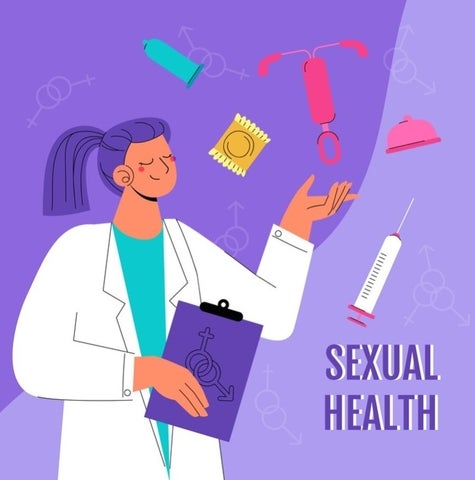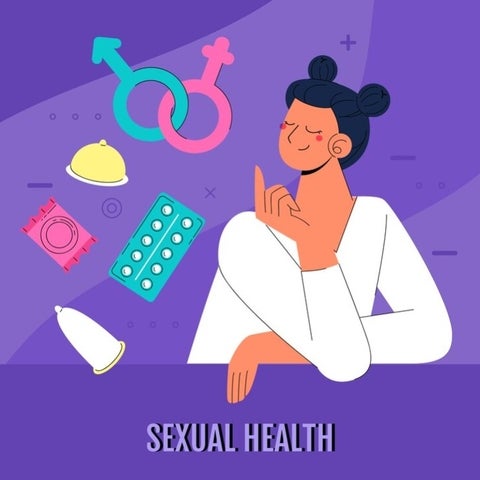It’s Valentine's Day -- the perfect time to talk about sexual health! No this isn’t your cringe high school health class; however, most of us feel somewhat bashful about discussing sexual health. Because of the embarrassment and stigma about sexual health, many people delay seeking treatment resulting in larger and more impactful problems.
Sexual health encompasses not only physical but also emotional, mental, and social aspects of your sexual well-being. However, it can often be shrouded in stigma and myths, making it essential to access reliable information. What is most important about sexual health is having the knowledge needed to make informed choices.
-
Consent and respecting boundaries: Only 1 in 3 Canadians understands consent. It is important to have a “sober yes” before engaging in intimate activities. AND, it is important to remember that we are all into different things. Just because someone said yes to one activity, doesn’t mean they are OK with other activities. Know the facts about consent and respect your partner’s boundaries. For more info on consent, check out the Cycling Through Consent video created by Western University.
-
Starting the conversation: Sex is a life-affirming act, one of the most intimate things you can do with another person. But talking about it? So much harder. Some experts argue that talking about sex makes us more vulnerable than having sex. Talking about sexual histories and likes and dislikes is an important part of sexual health. Check out this article in the Guardian for some great tips on how to have a conversation about sex.
-
Physiology and injury prevention: Sexual injuries are more common than you think. They can span from minor abrasions to injuries that require surgery. For information on the common types of sexual injuries, check out this Safe Sex guide (not an exhaustive list). You can also check out this tik tok video by Dr. Adam Gaston about not putting things where they don’t belong. Funny but true.
-
Sexually transmitted illnesses (STI) and safe sex: STIs are infectious diseases that are spread through any type of sexual contact. Symptoms range from sores and bumps (herpes simplex & HVP) to burning and painful urination or discharge, and several we have not listed. Left untreated, STIs can lead to infertility, cancer, and in some cases even death (HIV and syphilis). The best protection against STIs is the proper use of condoms, gloves, or dams. For more information on STIs check out the Campus Wellness Sexual Health webpage.
-
Impact of porn on relationships and sexual health: Appropriate use of porn can enhance a relationship; however, research shows porn can cause more harm than good. Most of us don’t physically look like the people portrayed in porn, and it is difficult to live up to those expectations. Porn has also been linked to increases in erectile dysfunction, relationship and intimacy issues, as well as types of intimate partner violence. Check out this article on What Could Happen to your Sex Life if you Watch Porn, and this research article on the impact of porn on youth.
What to do if you:
Issues related to sexual well-being are often complex and shrouded in embarrassment, stigma, and taboos. It can be uncomfortable and outright scary to seek help. Below are some safe options to support you:
-
Want more information: Visit the Campus Wellness Sexual Health webpage and check out the videos by Samantha Bitty, as well as the articles and information provided. You will also find helpful information at Sexandu.ca.
-
Think you might be pregnant: Proper care at the beginning of a pregnancy can directly impact the outcome of the pregnancy, and the health of both parent and child. Make an appointment with your family doctor or a Health Services physician as soon as you think you might be pregnant. In Waterloo Region, you can also contact the SHORE Centre.
-
Think you might have and STI: Receiving treatment early is important. It is recommended you make an appointment with your family doctor or a Health Services physician as soon as you think you might have an STIs. If you are not comfortable going to your primary care physician, most cities in Canada have a free sexual health clinic where you can receive judgment-free testing and treatment. When out of town, google sexual health services in your region. You can find local services on the Waterloo Region Sexual Health Services website. In Cambridge, visit the Dawn Centre.
-
Think you have experienced a sexual injury: If the injury is minor such as a mild abrasion, it will usually heal on its own in a couple of days. If the issue persists, or for larger issues, early treatment is important—especially for vaginal bleeding or penial fractures. Depending on the severity of the injury, emergency medical care may be needed. For less severe injuries, make an appointment with your family doctor or a Health Services physician as soon as possible.
-
Experienced sexual harassment, coercion, or assault: The Sexual Violence Prevention and Response Office (SVPRO) provides support to those impacted by sexual violence. They offer confidential support. Most cities in Canada have a sexual assault support centre. In Waterloo Region you can contact SASC Waterloo Region.
Whether you're in a relationship or enjoying single life, prioritizing sexual health is an act of self-love. This Valentine's Day, celebrate love not just with chocolates and roses, but by prioritizing your sexual health.


